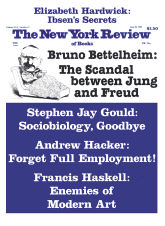In response to:
Saving the Free World: An Exchange from the May 12, 1983 issue
To the Editors:
I have followed with interest Alfred Kazin’s remarks on my opinions and political history and Eugene Genovese’s generous response as they have appeared in your pages for March 31 and May 12. I do not write to contribute to this discussion but rather to correct certain careless errors of fact in Mr. Kazin’s essay. I will pass without comment his contention that Irving Kristol knows anything about my “views.” That is another quarrel. But he should know that I was never nominated to be Chairman of the National Endowment for the Humanities. There were only rumors to that effect—to which there was a well-orchestrated response. Furthermore, Gertrude Himmelfarb was not appointed to the Council, which advises the leaders of NEH, by Dr. William Bennet. Such appointments come only from the President. The only appointment I received was to the Board of Foreign Scholarships.
In his response to Genovese’s letter published May 12, Mr. Kazin writes that I described the Gettysburg Address as “an association of Lincoln and Oriental despotism.” This is to misread my remarks in A Better Guide Than Reason, where I argue that there is an analogy between Lincoln’s use of epidictic rhetoric and what the ancient rhetoricians call the “Asiatic style”—the idiom of priests/kings. The distinction is significant. In “Saving My Soul at the Plaza” Mr. Kazin observes that I have criticized Lincoln for violating due process in issuing the Emancipation Proclamation. I’ve written nothing about Lincoln and the war powers and indeed have no reason to doubt that they are sufficient to authorize confiscation of property—of whatever kind. Mr. Kazin got his opinion from unsigned matter in The New Republic for December 16, 1981, for he repeats the error made there. I would welcome a careful examination of my writings by The New York Review of Books, however critical the results might be. But I do not care for ignorant misrepresentation.
M.E. Bradford
Irving, Texas
Alfred Kazin replies:
On the matters of fact relating to Professor Bradford’s supposed nomination as NEH director, I will take his word for it. I have to add, however, that he seems to me a most unfortunate man. His views of the “irrepressible conflict” are so abstract, and his sanctification of southern life so unhistorical, that he inevitably lends himself to rumors and “misrepresentation.”
Professor Bradford’s reading of the Gettysburg Address as a rhetorical exercise in “Asiatic style” is insulting to Lincoln’s idea of liberty and, if Professor Bradford means it at all, a piece of self-deception.
Nothing I have read by Professor Bradford indicates awareness that his cherished values—which he thinks still operate in the South—rested on human servitude. The charge against Professor Bradford was his supposed claim that Lincoln had violated due process, the slaveowners’ rights of property, in issuing the Emancipation Proclamation. And what does Professor Bradford’s letter say? He has “no reason to doubt that they [the war powers] are sufficient to authorize confiscation of property—of whatever kind” (my italics).
This Issue
June 30, 1983



